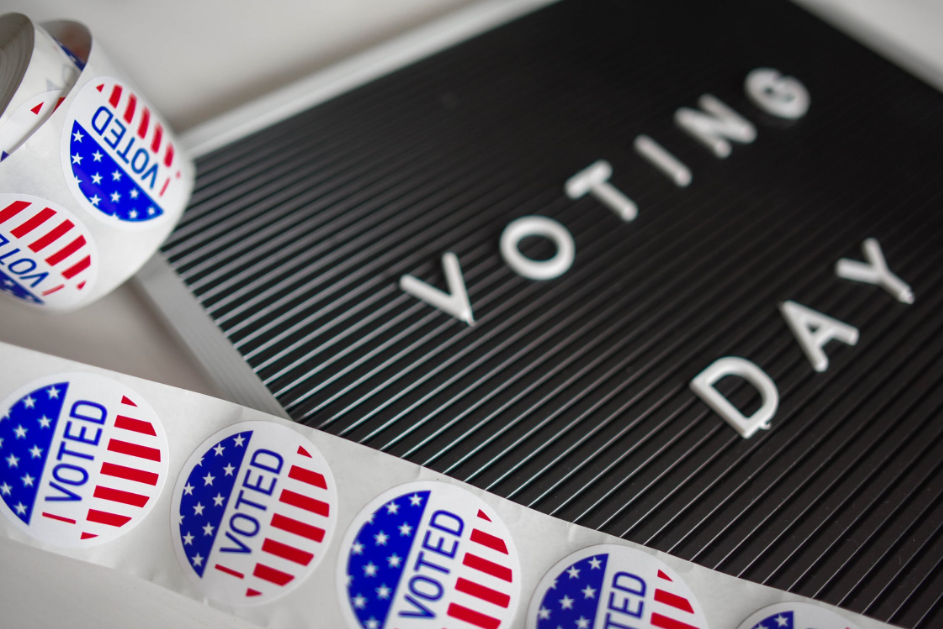Talking Politics at Work: The Dos and Don’ts of Discussing Elections with Your Coworkers

Eight business professionals share two different approaches on how organizations can successfully navigate talking politics at work.
Although a divisive and polarizing topic, you may assume that talking politics at work is too taboo for employers to be worried about. And, in many cases, you’d be right. According to research done by Clutch, people don’t typically feel the need to discuss politics with their colleagues, with only 8% of employees feeling discriminated against due to their political views over the past year.
In this article, you’ll learn about:
- How to Successfully Navigate Political Discussions at Work
- HR Resources for Discussing Politics in the Workplace
- Training and Development for Polarizing Office Topics
However, Clutch also shares that the urge to talk politics at work may be stronger during election campaigns. So, with the US Presidential Election coming up in the fall, the number of workplace political discussions may grow – and possibly lead to some uncomfortable tension among colleagues.
Below, eight business professionals from a variety of industries share two different ways HR and leadership teams can effectively manage political discussions in the workplace. Read on to find out what they had to say.
How to Successfully Navigate Political Discussions at Work
Founders, managers, and c-suite executives weigh in on how your organization can constructively address this tricky “water cooler” topic.
APPROACH #1: Remove Politics from the Conversation
One way to ensure discussing politics in the workplace doesn’t become a problem? Ask employees to take the subject off the table. Here, five business leaders explain why they believe politics is best left out of the office, and how you can encourage employees to leave this hot-button topic alone.
Name: Viola Eva
Position: Founder
Company: Flow SEO

“When it comes to talking about politics in the office, it can quickly turn into an unpleasant situation that is best avoided at all costs. As with most other things, I always like to tackle a problem before it actually turns into one. Consider sending out a memo or including a blurb in your company memo. With elections just around the corner, things are likely to heat up. However, that doesn’t mean you can’t keep things nice and chill around the office.”
Name: Bart Turczynski
Position: Editor-In-Chief & Career Expert
Company: Zety

“My advice? Better be safe than sorry. It is absolutely fine to be passionate about politics; most people are. But as much as you might want to keep that conversation going with your co-workers or a boss, there’s a reason politics are considered a taboo workplace topic … They can not only cause tension in the workplace but also, accidentally, can make your co-workers feel disrespected, uncomfortable, or even bullied. So, when at work, keep it to yourself, no matter how like-minded you feel your work peers are. If you, on the other hand, are asked to take part in talking politics, don’t ever feel like you need to join. It is an off-limit conversation, and you have every right to keep your opinion private. Make a small joke, respectfully deny your participation or simply say you’re in a hurry.”
Name: Andrea Loubier
Position: CEO
Company: Mailbird

“If you’re hoping that talk of politics won’t creep into your office, then you’re probably going to be both disappointed and unprepared. Establishing a welcoming office culture is very important in today’s workplace, but allowing discussions that could lead into debates is always unwise, AND it could quickly divide your employees. If you or other department heads are witness to these discussions, be sure that those involved understand that they can’t happen at work. It’s absolutely best for everyone involved.”
Name: Morgan Taylor
Position: Finance Expert & CMO
Company: LetMeBank

“The easiest method for dealing with politics in the workplace is avoidance. Have a basic policy that says that offensive or polarizing topics are not permitted. This is a hazy area, because you don’t want to encroach on people’s right to free speech, but when something has the potential to impact the quality and positive attitude of the workplace, you can carefully suggest that people not deliberately incite the opinions of others. If politics do come up, encourage people to voice their discomfort with management. Allow people to say that this conversation makes them uncomfortable and then address that problem (keeping everyone anonymous) with the person bringing up politics. Let them know that everyone has their own opinion and is entitled to it. It would be better if they were more careful about bringing up sensitive topics.”
Name: Alexandra Zamolo
Position: Head of Content Marketing
Company: Beekeeper

“Handling office disputes is difficult enough as it is, but when they center around passionate conversations about politics, things can get even trickier. Be sure to include this policy in any company onboarding for new hires, and it doesn’t hurt to send them to everyone in the workplace as a refresher. There’s a time and a place to discuss such matters, but make it abundantly clear that the office isn’t one of them. If the problem persists, make those involved aware that measures will be taken so that such discussions do not spread. As the old saying goes, it only takes one bad apple.”
APPROACH #2: Keep It Respectful and Lead by Example
If your organization would prefer to keep political discussions open or you find that the topic keeps coming up regardless of office policy, try these tips from seasoned business professionals.
Name: Yaniv Masjedi
Position: CMO
Company: Nextiva

“As a C-level executive, people look to me and our other leadership to see what will be acceptable within our organization. When it comes to politics, if we make a habit of debating political issues for 15 minutes at the beginning of meetings, so will others in our organization. But if you’d prefer people minimize the time they spend talking politics in the office, don’t make it an issue you talk about much yourself, and use your position to minimize the time spent on those issues when they do come up. It’s good for team members to be active in their communities and to care about elections. But you need to set the expectation that political differences shouldn’t undermine the sense of teamwork you’ve worked so hard to create within your company.”
Name: Walt Capell
Position: President
Company: Workers Compensation Shop

“We talk about it periodically in some staff meetings. We suggest people speak about politics as little as possible. When it does come up, we stress a culture of tolerance of all viewpoints. Addressing the situation and not letting anything fester is the best way to address any stressful situation in the workplace. Encouraging everyone to talk about politics as little as possible is a start, but you have to understand it will come up from time to time. When politics comes up, it is important to show a mood of tolerance from senior leadership, on down through managers.”
Name: Chad Hill
Position: CMO
Company: Hill & Ponton Law

“The two things you don’t ever want to talk about if you don’t want an argument are politics and religion, but more and more people incorporate one or both of these things in their identity. While employees are put on board not only because of their experiences and achievements, but also because of their inherent values, having disagreements is an unavoidable occurrence. I don’t recommend cutting off dissenting opinions or prohibiting political talk altogether, as the former alienates while the latter stifles, and both hamper productivity and motivation. Instead, moderating these discussions from time to time and leading by example prove more effective. As the leader, even by position at first, being a model of how you consider your co-workers’ opinions influence your team to do the same, even if it is subtle at first. Reminding your team that this is a workplace environment also reminds them that talk like this is saved for outside work. Even as a leader, you also hold strong opinions politically, but being a model of professionalism and respect can motivate your team to follow suit. After all, as the person in power, you can hold your opinions over them, yet you do not.”
HR Resources for Discussing Politics in the Workplace

While it may be tempting to completely ban all political talk at the office, the reality is that this topic can be tricky to maneuver in terms of labor laws and human rights’ issues.
If you’d like to come up with a company policy or code of conduct for discussing politics in the workplace, try to avoid blanket statements that may go against employee rights, such as: “Absolutely no political discussions between colleagues.”
Below are resources you can look to for guidance when creating your office policy on politics:
- National Labor Relations Act (United States)
- Canadian Human Rights Commission (Canada)
- Prohibited Political Activity Policy by SHRM
You can also opt to include policies on talking about politics in related sections of a more comprehensive document, such as your company’s Employee Handbook. For example:
- Dress Code Policy: In this section, outline clothing that is inappropriate for employees to wear to work, including items that discriminate against politics.
- Discrimination Policy: State that prejudicial treatment of employees based on political beliefs won’t be tolerated.
- Social Media Policy: Depending on your organization, you may choose to address both company social media accounts and employees’ personal profiles.
- Company Accounts: Make it clear that employees are not to post political opinions on the business’ social media profiles.
- Personal Accounts: If employees choose to identify themselves as part of your organization on their personal profiles, establish that they should not remark on politics, as their content may be seen as directly related to your company. You could also consider asking your team to refrain from posting political views through personal accounts during work hours, regardless of their profile’s link to your business.
- Company Accounts: Make it clear that employees are not to post political opinions on the business’ social media profiles.
Training and Development for Polarizing Office Topics

If your organization is struggling to address this or any other challenging subject matter, here are the top training and development programs that our team recommends.
- Emotional Intelligence: Help your group develop their self-awareness and social skills, so that they are better equipped to handle sensitive discussions with their colleagues.
- Conflict Resolution: Learn how to turn a negative clash with a coworker into an opportunity to strengthen relationships.
Whether you choose to limit discussions at your office or encourage employees to respect their colleagues’ opinions, navigating political topics can be challenging. With your team, determine what works best for your organization, and consider creating a code of conduct that covers company policy regarding politics. For teams struggling to see eye to eye on this subject, you can also consider training and development programs.
What’s your experience with discussing politics in the workplace? Share them with us in the comments below.
Learn More About Training and Development for Your Group
For more information about how training and development can benefit your group, reach out to our Employee Engagement Consultants.




Comments